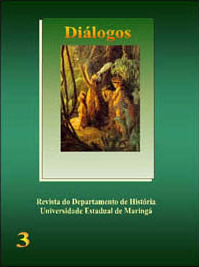Repensando o recrutamento militar no Brasil imperial
Abstract
O recrutamento para as forças armadas do Império brasileiro, geralmente considerado a imposição de um estado forte sobre uma sociedade recalcitrante, foi, ao contrário, moldado por uma complexa rede de relações patrono-cliente entre o Estado, membros da classe senhorial e os pobres livres. Essas bem-estabelecidas (e em geral legítimas) relações sobreviveram aos desafios de recrutamento em tempo de guerra e impediram que reformadores estabelecessem um sistema regular e justo de conscrição Abstract. Recruitment for the imperial Brazilian armed forces, generally considered the imposition of a strong state on a recalcitrant society, was rather shaped by a complex network of patron-client relationship between the state, the members of the plantation class, and the free poor. These well-established (and largely legitimate) relationships survived the challenges of wartime recruitment and prevented reformers from establishing a regular and fair system of conscription.Downloads
DECLARAÇÃO DE ORIGINALIDADE E CESSÃO DE DIREITOS AUTORAIS
Declaro que o presente artigo é original, não tendo sido submetido à publicação em qualquer outro periódico nacional ou internacional, quer seja em parte ou em sua totalidade. Declaro, ainda, que uma vez publicado na revista DIÁLOGOS, editada pela Universidade Estadual de Maringá, o mesmo jamais será submetido por mim ou por qualquer um dos demais co-autores a qualquer outro periódico. Através deste instrumento, em meu nome e em nome dos demais co-autores, porventura existentes, cedo os direitos autorais do referido artigo à Universidade Estadual de Maringá e declaro estar ciente de que a não observância deste compromisso submeterá o infrator a sanções e penas previstas na Lei de Proteção de Direitos Autorias (N. 9609, de 19/02/98).
STATEMENT OF ORIGINALITY AND COPYRIGHT CESSION
I declare that the present article is original, has not been submitted for publishing on any other national or international journal, neither partly nor fully. I further declare that, once published on DIÁLOGOS journal, edited by the State University of Maringá, it will never be submitted by me or by any of the other co-authors to another journal. By means of this instrument, on my behalf and on behalf of the other co-authors, if any, I waive the copyright of said article to the State University of Maringá and declare that I am aware that non-compliance with this commitment will subject the violator to sanctions and penalties set forth in the Copyright Protection Law (No 9609, of 19/02/98).

















